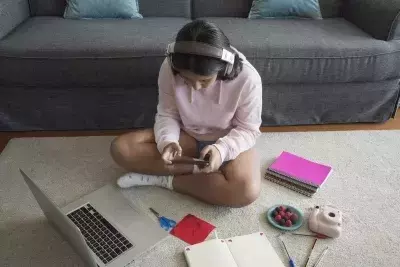
Emerging research indicates a notable link between young adolescents' engagement with social media platforms and a decline in their cognitive abilities, particularly in areas of reading comprehension, vocabulary acquisition, and memory function. This finding stems from an extensive, ongoing study tracking thousands of preteens through their adolescent years. Psychologists and pediatricians are voicing concerns that the pervasive use of social media may be reshaping how young minds process information, potentially hindering their capacity for traditional learning and focus. This study underscores the importance of examining the cognitive impacts of social media beyond its often-discussed effects on mental health, especially given the current debate surrounding phone usage policies in educational settings.
Further delving into the data, the study categorized participants into groups based on their social media habits. A significant portion of children either used minimal social media or none at all. However, a considerable subgroup gradually increased their daily social media time to about an hour by age 13, and a smaller, but concerning, group escalated their usage to three or more hours daily. The study's results revealed that even moderate social media users showed a slight dip in their reading and memory test scores compared to non-users. This discrepancy became more pronounced in the high-usage group, suggesting a 'dosage effect' where increased exposure correlates with greater cognitive impairment. Experts warn that even minor initial differences could lead to substantial developmental gaps over time, as social media use tends to intensify in later adolescence.
Adolescence is a crucial phase for brain development, characterized by significant growth and reorganization. During this period, the brain adapts and refines its structures based on an individual's experiences. Research suggests that heavy social media use can lead to brains becoming overly attuned to the instant gratification and feedback loops inherent in these platforms. This optimization for social media engagement may inadvertently detract from the brain's capacity for other essential cognitive functions required for academic success. In response to these findings, there is a growing call for policy changes, including the implementation of age limits for social media access, as seen in recent initiatives by countries like Denmark and Australia, aiming to safeguard children's cognitive development and overall well-being.
These comprehensive studies illuminate the profound and multifaceted impact of social media on the developing minds of young people. By meticulously analyzing the correlation between social media engagement and cognitive function, researchers provide invaluable insights that compel us to critically re-evaluate the digital environments we offer to our youth. The findings advocate for a proactive and responsible approach, urging parents, educators, policymakers, and technology creators to collaborate in fostering digital habits that promote healthy intellectual growth and well-being. Ultimately, empowering adolescents with the tools to navigate the digital world judiciously, while ensuring their foundational cognitive skills are nurtured, is paramount for their holistic development and future success. This collective endeavor will shape a generation that is not only digitally literate but also critically thoughtful and resilient.
